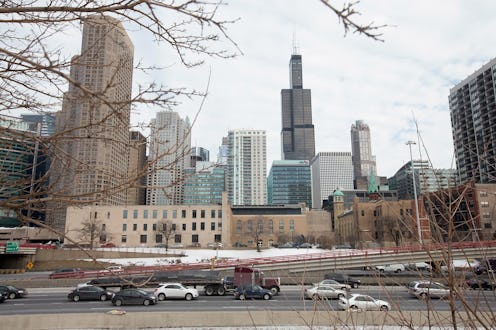News
Chicago Cop Charged With Murder Of Laquan McDonald
The white Chicago police officer who fatally shot black teenager Laquan McDonald in 2014, Jason Van Dyke, has been charged with first-degree murder. On Tuesday morning, Van Dyke turned himself in to authorities and is slated to appear in bond court at noon. The officer was charged for shooting 17-year-old McDonald 16 times after the teen allegedly lunged at him with a pocketknife. The incident was caught on a dash cam and a Cook County judge has ordered the Chicago Police Department to release the video no later than Wednesday. The city is now bracing for more riots with the release of the video, which Van Dyke's attorney has described as "graphic and violent."
Even though there is video footage, Van Dyke's attorney, Dan Herbert, maintains that it's not enough to determine that his client "acted inappropriately" when he fatally shot McDonald in October 2014. Herbert told reporters at a press conference last Friday:
He is scared to death about possible outcomes here. But he has been a professional and he has really been selfless. His concern is for his wife and his two young kids who are in grammar school.
Now, charged with first-degree murder, Van Dyke could face a minimum of 20 years in prison if he is convicted.
On the other side, attorneys for the McDonald family believe that the footage will speak for itself. According to them, the video shows McDonald holding a small four-inch knife and walking away from the officers when one of them suddenly starts opening fire on the teen. After the first few bullets force McDonald to the ground, the officer continues unloading his gun and shoots him a total of 16 times.
Van Dyke claims that McDonald was acting erratically and had refused to drop his knife. Both Van Dyke and his lawyer maintain that McDonald had lunged at the officer and his partner and that the cop started shooting in self-defense and out of fear for his life. An autopsy report found PCP in McDonald's system.
Herbert also argued that the dash-cam video only shows a partial view of the shooting and does not show what happened before it.
The video by nature is two dimensional so the problem is it distorts distances, and distances and depth perception are important. The most critical problem is that the video does not depict what my client was seeing. It is not a video from the eyes of my client.
Regardless, the video is expected to shed much light on the incident. However, even though it could be a crucial piece of evidence in bringing justice for McDonald, the teen's mother is concerned it will spark unrest in the city. The family's attorney, Mike Robbins, told reporters last Thursday that McDonald's mother "is not looking forward to the day this is released."
This story is developing...
